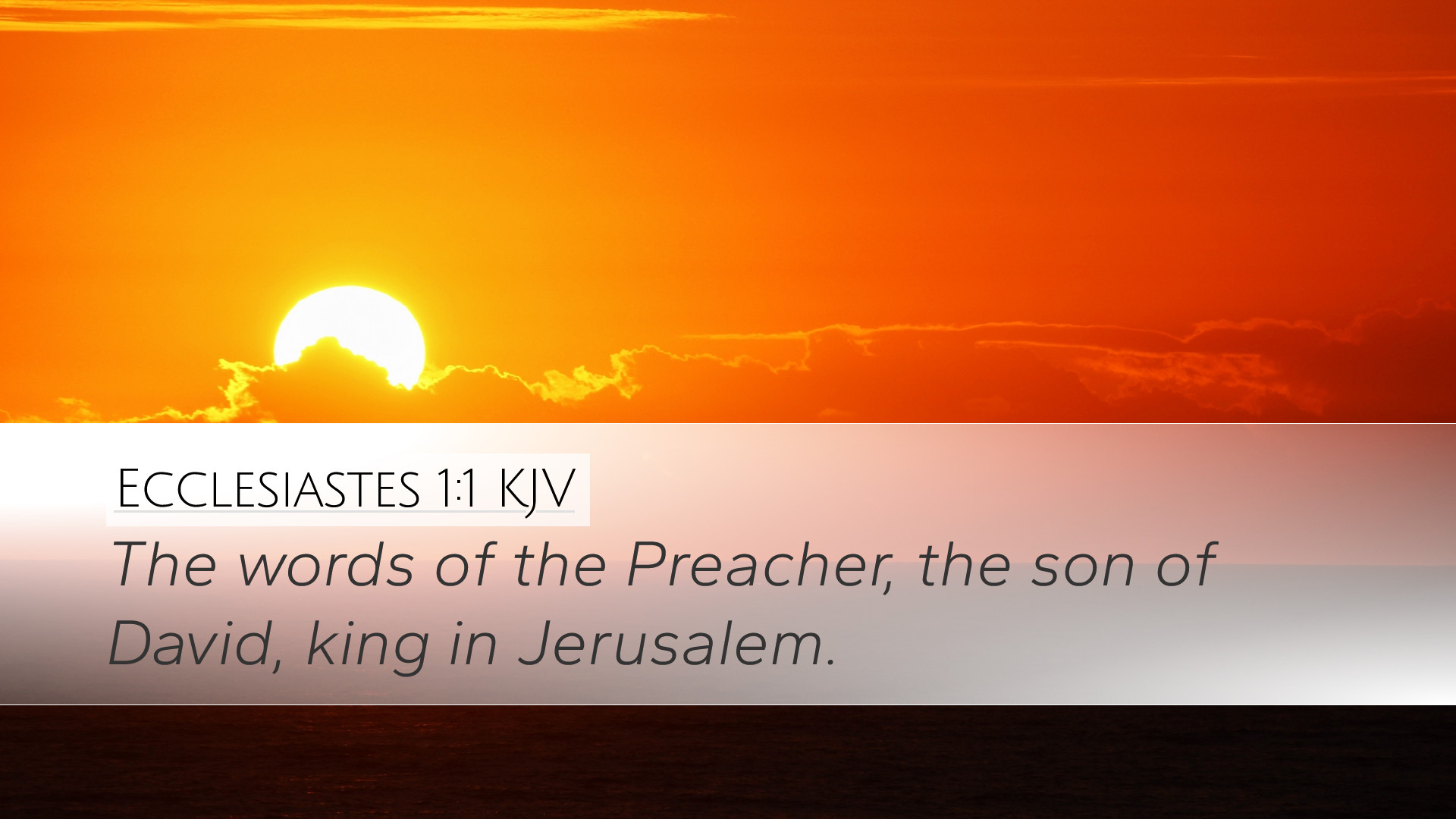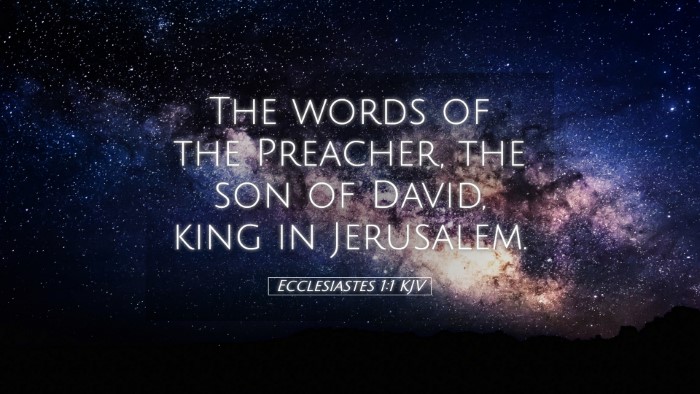Commentary on Ecclesiastes 1:1
Verse: "The words of the Preacher, the son of David, king in Jerusalem."
Introduction
Ecclesiastes, traditionally attributed to Solomon, serves as a profound philosophical discourse on the nature of life, purpose, and the human experience. In this inaugural verse, the identity and authority of the author are established, inviting readers to engage with the wisdom that follows.
Authorial Identity
1. The Preacher: The term "Preacher" (in Hebrew, Qoheleth) conveys the role of one who convenes, teaches, or gathers an assembly. This positions the author not merely as a solitary philosopher but as one imparting wisdom to a collective within the community.
- Matthew Henry: Henry emphasizes the importance of the title "Preacher," affirming that it signifies a divine appointment to dispense wisdom.
- Albert Barnes: Barnes notes that the title suggests an authority rooted in experience, indicating that the teachings are borne from profound life observations.
- Adam Clarke: Clarke elaborates on the role of the Preacher as one who speaks from a place of learned understanding, further enhancing the weight of the presented message.
Royal Lineage
2. The Son of David: The mention of "son of David" signals not only royal heritage but also evokes a sense of historical continuity and covenant. Solomon's lineage confers significance, as it identifies him with the promises made by God to David regarding his descendants.
- Matthew Henry: He highlights the theological implications of David’s lineage, framing Solomon’s wisdom as part of God’s unfolding plan for Israel.
- Albert Barnes: Barnes juxtaposes Solomon's royal status with the democratic nature of the Preacher's reflections, exploring the tension between earthly authority and divine truth.
- Adam Clarke: Clarke reflects on Solomon's wisdom, emphasizing that his privileged background provides a unique lens through which to view the complexities of life.
The Setting: King in Jerusalem
3. King in Jerusalem: Jerusalem symbolizes not only political power but also spiritual significance, being the center of worship. This context frames the reflections that follow as deeply interconnected with both temporal and eternal realities.
- Matthew Henry: He discusses the contrast between earthly kingship and the pursuit of divine wisdom, suggesting that true understanding transcends human authority.
- Albert Barnes: Barnes notes the geographical and historical importance of Jerusalem, reinforcing the weight of Solomon’s observations as coming from a pivotal location.
- Adam Clarke: Clarke emphasizes that this title serves to ground the Preacher’s thoughts in a rich historical context, noting that they arise from a period of prosperity and power.
Thematic Implications
The introduction establishes key themes that permeate the book, including the quest for meaning and the futility of material pursuits. Understanding the spiritual and philosophical weight of the title invites deeper engagement with the text.
- Matthew Henry: He asserts that the acknowledgment of futility in human endeavors catalyzes a search for a higher purpose, setting the tone for the entire work.
- Albert Barnes: Barnes suggests that the Preacher’s existential reflections serve to remind the reader of the transient nature of life, prompting a focus on eternal truths.
- Adam Clarke: Clarke identifies this verse as a gateway to understanding the contrast between divine wisdom and human folly, which is central to the book's message.
Literary Style and Structure
The opening verse represents a masterful invocation that employs both personal and communal reflection. This duality enhances the relevance of the forthcoming discourse to a broad audience.
- Matthew Henry: He remarks on the poetic structure, suggesting that the use of authoritative titles captures attention and lays the groundwork for the Preacher’s observations.
- Albert Barnes: Barnes analyzes the cyclical nature of the text, foreshadowing the repetitions that characterize Ecclesiastes, emphasizing the theme of life’s vanity.
- Adam Clarke: Clarke comments on the brevity and depth of the opening, advocating for a careful reading to appreciate the intricate layers of meaning.
Concluding Reflections
Ecclesiastes 1:1 effectively establishes the authority of the Preacher, situating his reflections within a royal narrative that enhances their philosophical heft. The dialogue between wisdom and the human experience initiated in this verse invites pastors, students, theologians, and scholars to delve into the perennial questions of life’s purpose and pursuit of meaning.
Final Thoughts
This verse resonates with timeless truths that speak across generations. Understanding its implications prepares the reader for a journey through profound insights, culminating in reflections on the divine purpose woven into the fabric of our impermanent existence.


